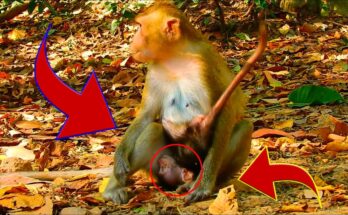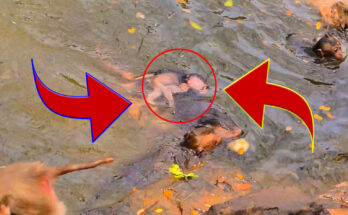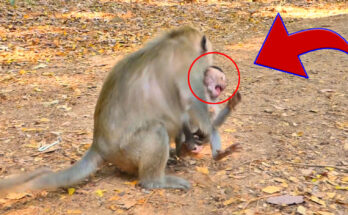In the dense jungle, where trees towered high and the canopy filtered sunlight in dappled patterns, a young monkey swung restlessly from branch to branch. Its tiny face, filled with a mixture of confusion and longing, searched the surroundings for the familiar figure of its mother. This young primate had not seen her for what felt like hours, though in the jungle, time could be a blurry, ever-shifting thing. All that mattered to this little one in that moment was the absence of the maternal figure that had always been its anchor in the world.
“What happened to the monkey mother?” one might wonder. In the animal kingdom, mothers play a central role in the survival of their young. They provide not only nourishment and protection but also emotional security. The absence of a mother, particularly at a time when a baby is hungry and vulnerable, can be traumatic, not just for the young one but for the entire troop.
Monkeys, like many mammals, form strong bonds with their offspring. A baby monkey relies on its mother for nutrition in the form of milk, which provides the necessary nutrients for growth and development. This bond is also emotional: the mother’s warmth, scent, and touch offer comfort and safety. For the young one, the mother is the world—without her, the little monkey feels disoriented and lost. The emotional need for the mother in these circumstances is powerful, so when the baby calls out or frantically searches for her, it is an expression of both a physical need (hunger) and an emotional one (comfort and security).
But why do babies look for their mothers so much in times of distress? It is not simply a matter of hunger; it is a deeper instinct, one rooted in survival. In nature, a baby that does not receive enough food or protection is unlikely to survive. The baby’s search for its mother is both a response to its hunger and an inborn drive to maintain its connection to the caregiver who is essential for its wellbeing. In the wild, the bond between a mother and her offspring is the foundation for the baby’s sense of security. Without it, the baby is at risk of being preyed upon by predators, losing access to food, or even suffering from the emotional stress of being alone.
When a baby monkey is hungry and unable to find its mother, it may begin to call out with increasingly frantic cries, hoping to attract attention. In some species, this can result in the young being reunited with their mothers or another member of the troop stepping in to provide care. This is not always the case, though. In situations where the mother is lost or injured, the baby might have to face the harsh reality of survival alone. The jungle is a ruthless place, and the young are often the most vulnerable.
The “hungry” cry of a baby monkey serves another important purpose: it alerts other members of the troop to the distress. In some primate species, there is a communal approach to raising young, where other adult females or even males will step in to help. They may not be the biological mother, but they understand the importance of looking out for the young and ensuring they are cared for. This social structure is crucial in many primate species, as it increases the survival rate of the infants and strengthens the bonds within the troop.
In the case where the baby cannot locate its mother or find help from others, it must rely on its own instincts to survive. These instincts may include foraging for food, finding shelter, and avoiding predators. However, none of this would come easily for a baby that has not yet developed the skills it needs to navigate the world. Hunger, fear, and loneliness may overwhelm the young one, further compounding its need for its mother’s comfort and protection.
The emotional distress of a hungry, lost baby is a universal experience that transcends species. While humans may not always face the immediate physical dangers of the wild, the fundamental needs for safety, security, and nourishment are the same. We, too, search for comfort when we feel vulnerable or distressed, just as this young monkey searches for its mother.
In the end, the answer to the question, “What happened to the monkey mother?” may be a sad one. She could have been lost or left behind in some way. But the emotional longing of the baby for its mother reflects a deeper truth about the role of caregivers in the lives of young creatures. The mother is not just a source of food but of love, security, and the emotional warmth needed for survival. The baby’s hunger is not just for food, but for everything that its mother represents. It is an instinctive, primal cry for connection—a call that reverberates throughout the jungle, echoing the need for care, safety, and nurturing.


